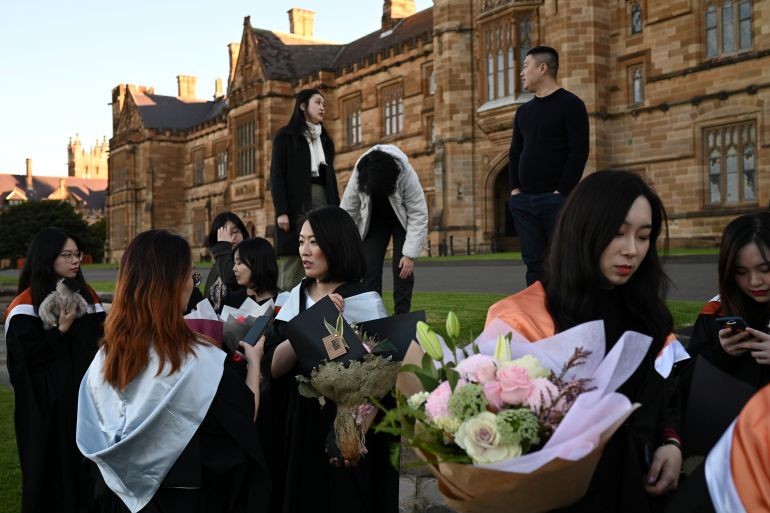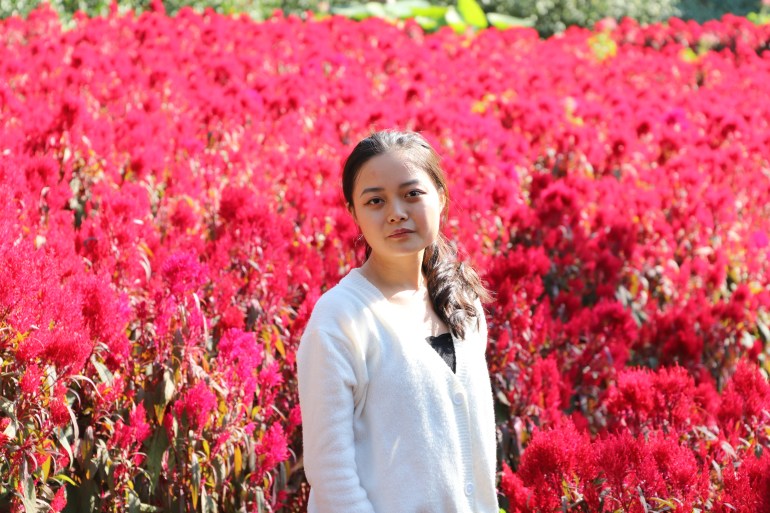‘I can’t trust them’: Students upset at Australia’s border U-turn
International students remain in limbo after Australia delays planned border reopening over Omicron variant.

Sydney, Australia – Thousands of miles away from Australia, Disha Zutshi’s heart sank when she heard the news that the country would delay its planned reopening to international students on December 1 due to the emergence of the Omicron coronavirus variant.
For the 18-year-old student from Gurgaon in India, the stress and anxiety of existing in limbo after 20 months of border closures have made her regret ever choosing the country to study in.
Keep reading
list of 4 itemsAsia holds tight on borders, casting cloud over COVID-hit travel
Collapse of tourism cost five Asian nations 1.6 million jobs: UN
Asia tightens borders as Omicron clouds region’s return to travel
Zutshi, who plans to fly to Australia in late December, has little confidence the government won’t extend its “temporary pause” on reopening beyond December 15 after Australia confirmed its seventh case of the new variant on Thursday.
“We don’t know if they might as well just extend in December,” Zutshi told Al Jazeera. “It’s very demotivating.”
Zutshi, who is studying psychology at the University of Melbourne, said she had many friends who had to cancel flights to Australia scheduled for this weekend.
“The tickets are very costly, extremely costly,” she said. “The government has absolutely no plans [to help the international students], and the airlines also do not have any way of compensating these students.”
Zutshi is among the roughly 130,000 international students who have been waiting desperately to get into Australia since the country shut its borders in March 2020. While some have deferred their studies, others have made do with studying online. After Australia’s decision to delay reopening the border, many students are dealing with anger, frustration and despair all over again.

Karen Gan, who is studying online from her home in Nanning city in China while she waits to get into Australia, told Al Jazeera she has lost trust in Australia’s Prime Minister Scott Morrison “because he is a big liar”.
“The Australian government made up their mind abruptly,” said Gan, who is studying for a masters in journalism at the University of Melbourne. “According to the news in 2020, they said you could go to Australia sooner or later, but now, delay and delay. I can’t trust them any more. I’m very confused and puzzled about their decision.”
“Perhaps staying in China is a better choice,” she added.
Australia was the third-most-popular education destination in the world before the pandemic. In 2019, the country’s education sector contributed 37.6 billion Australian dollars ($26.7bn) to the economy, supporting about 240,000 jobs.
After nearly two years of border closures, the sector’s revenues dropped 28 percent from $34.6 billion ($24.5bn) to $26.7 billion ($18.9bn) in 2020-21, the lowest since the 2015-2016 financial year. In August, the number of enrollments from overseas — most of them from China, India, Nepal and Vietnam — was its lowest since 2015, at just over 550,000.
Many universities have announced job cuts and axed courses as revenues have evaporated with the decline in overseas enrollments.
Meanwhile, countries such as the United States and the United Kingdom have already welcomed the return of international students.
Chris Ziguras, a global studies professor at RMIT University in Melbourne, told Al Jazeera that while the Australian government’s stance was led by public health concerns, it has failed to communicate a clear path to reopening, leaving the sector “blindsided and scrambling to catch up”.
“I guess the government is reluctant to make any commitments because they don’t know what’s going to happen,” Ziguras said. “And then the government wants to leave its options open until the last possible minute and then decide.”
‘Cash cows’
Students have also been discouraged by the Australian government’s attitude towards them.
Oscar Ong, national president of the Council of International Students Australia, told Al Jazeera that international students have been treated as “cash cows” due to the revenue they bring to Australia’s universities and economy.
“We hope that the Australian government would be able to treat international students just like residents,” Ong said. “International students are not just coming here to study, not just get into work — a lot of them want to come here to live as well.”
Universities Australia Chief Executive Officer Catriona Jackson said universities would continue working closely with the Australian government to bring international students back on campus.
“It’s important to acknowledge the incredible resilience of those who have waited patiently for up to two years to resume their studies on campus,” Jackson said.
In the meantime, international students such as Toolsika Rawoah can do little but wait.
Rawoah, who has been studying online from Mauritius, said she would hold off on booking tickets to Australia and see if more restrictions are on the way.
“It does negatively impact on the hopes of all students who were excited to resume their lives in Australia and personally to me too, as there are too many uncertainties,” said Rawoah, who is studying criminal justice and psychology at Victoria University in Melbourne.
Rawoah said existing in a state of limbo for so long has severely affected both her studies and mental health.
“There is no stability in maintaining a healthy working life with so many uncertainties about whether students will eventually be able to come back, or if they have to wait a long time for seats on planes to be available, ” she said.